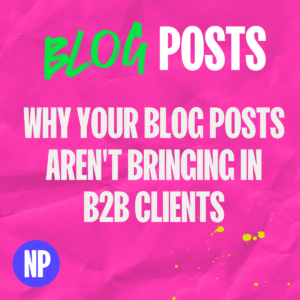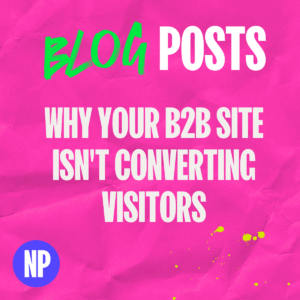(This is the 29/07/2025 issue of my newsletter – subscribe here)
Hey hey!
What’s been happening in SEO-land this week?
Well, the fabulous Aleyda Solís ran a test showing that ChatGPT uses Google’s search snippets for answers – which pretty much shows that what a lot of good SEOs have been saying all along is true – good SEO is still your best bet for AI search visibility – no GEO needed!
Google launched Web Guide in Search Labs this week, which clusters search results into topic groups instead of giving you the usual list. It’s still experimental, so I wouldn’t worry about it just yet, but I’m keeping an eye on how it develops.
And we got official confirmation about what actually gets your pages indexed – and judging by some of the conversations I’m seeing on social media, a lot of people are confusing indexing with ranking. Getting indexed won’t bring you visitors on its own. I’ll talk more about this later in the newsletter.
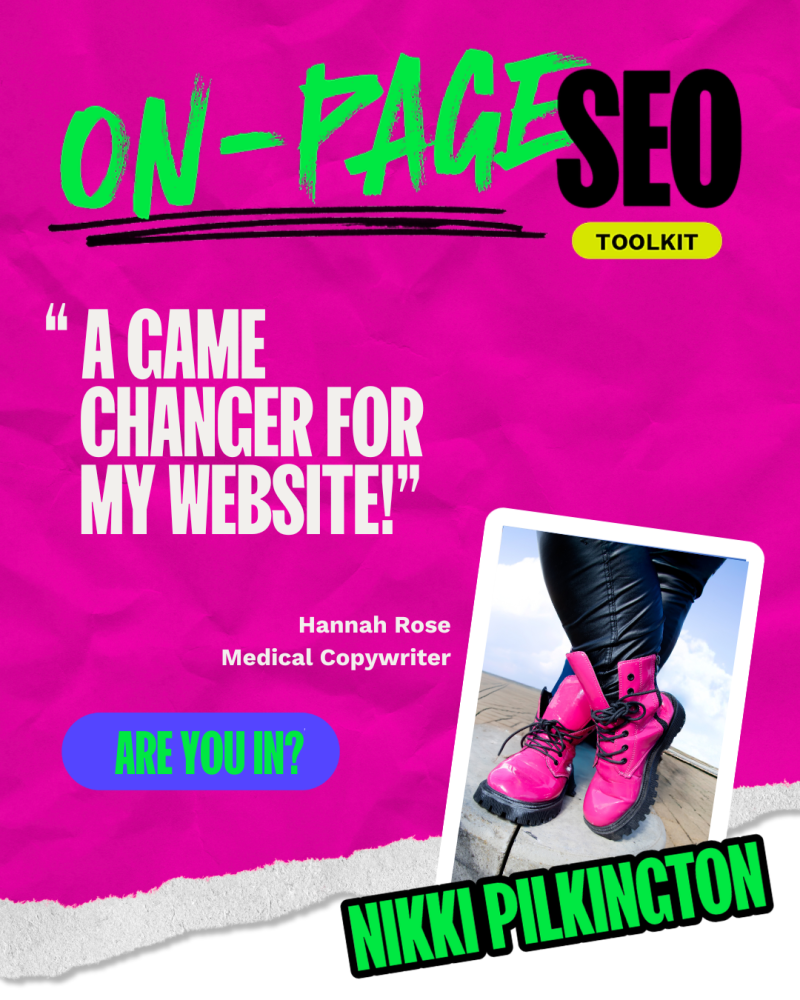
What you’ll find inside
1 | Weekly thoughts – Getting indexed is just the beginning
2 | Blog post – Why your freelancers probably hate you
3 | SEO tip – How to check if your pages are indexed
Let’s dig in, shall we?
Why indexing doesn’t equal traffic to your website
Right, let’s talk about the difference between indexing and ranking – because judging by some of the conversations I’ve seen, some people forget that they’re not the same thing.
You may have seen this image circulating on social media – it’s a slide from a presentation by Gary Illyes and Cherry Sireetorn Prommawin at Search Central Live. It confirms what [good] SEOs have pretty much always known about the things that Google takes into account when crawling pages to see if they should be indexed.

There are no surprises for most SEOs – but what I’ve seen doing the rounds is a little bit concerning – people conflating INDEXING with RANKING.
Getting your website (crawled and) indexed is just the first step. Ranking is what brings you visitors.
Let’s be clear about what these terms mean:
- Crawling is when Google visits your page to read it.
- Indexing is when Google decides to include that page in their search database.
- Ranking is where that page appears in search results for specific queries.
Three separate processes, three different sets of factors.
The reason this image is confusing for some is that many things that don’t influence indexing absolutely do matter for ranking. Content depth, search intent matching, topical authority, etc. – these help determine where you rank, not whether you get indexed.
And sadly, this is where dodgy SEO agencies muddy the waters. They’ll sell you expensive technical audits focusing on crawlability issues, or promise to fix your “indexing problems” by restructuring your internal links. Meanwhile, if your pages are indexed but buried on page 50, that’s a ranking problem requiring completely different solutions.
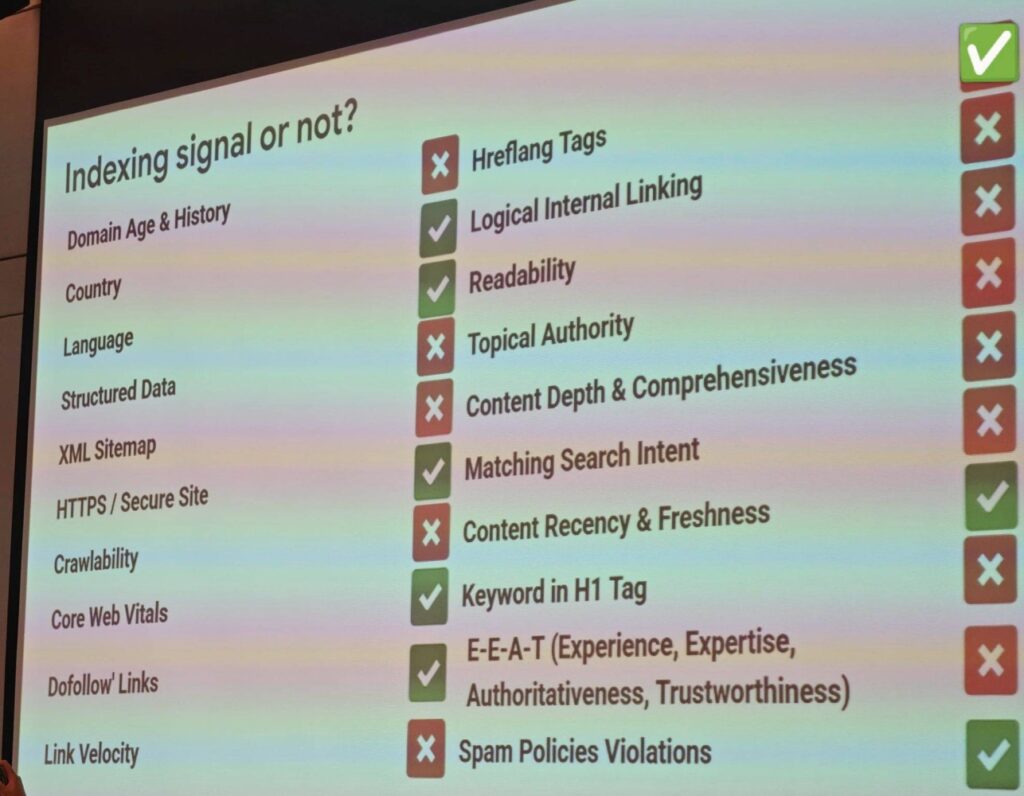
Stop micro-managing your freelancers!
I wanted to call this one “Why your freelancers hate you and what you can do about it”, but I bottled out because it made me sound like an arse to work with, and I’m not, I promise.
When you hire a freelancer, you’re engaging an independent business, not recruiting someone you can micromanage. The post covers what doesn’t work (like expecting them to attend every internal meeting) plus what works to create a business partnership that works for both parties.
Your free SEO tip
Want to know if your pages are actually indexed rather than just crawled? Here’s how to check properly.
Start with a site: search in Google. Type site:yourwebsite.com/specific-page-url (replace with your actual domain and page) and see if it appears in the results. If it shows up, Google has indexed it. If not, it might not be indexed yet, or Google might have decided it’s not worth including.
But don’t stop there – the site: search isn’t infallible. For the definitive answer, log into Google Search Console and use the URL inspection tool. Paste in your URL and click return or enter. This will tell you whether the page is indexed. If not, this article should help with some of the reasons why.
You might discover that pages you thought were indexed are actually being excluded for one of many common reasons: canonical issues, duplicate content, 404 errors, redirect problems, or other issues that are easily fixable. Or you might find that pages are indexed but not ranking – which brings us back to today’s main point. Getting indexed is just step one. If your pages are indexed but buried on page 10, you’ve got a ranking problem, not an indexing problem.
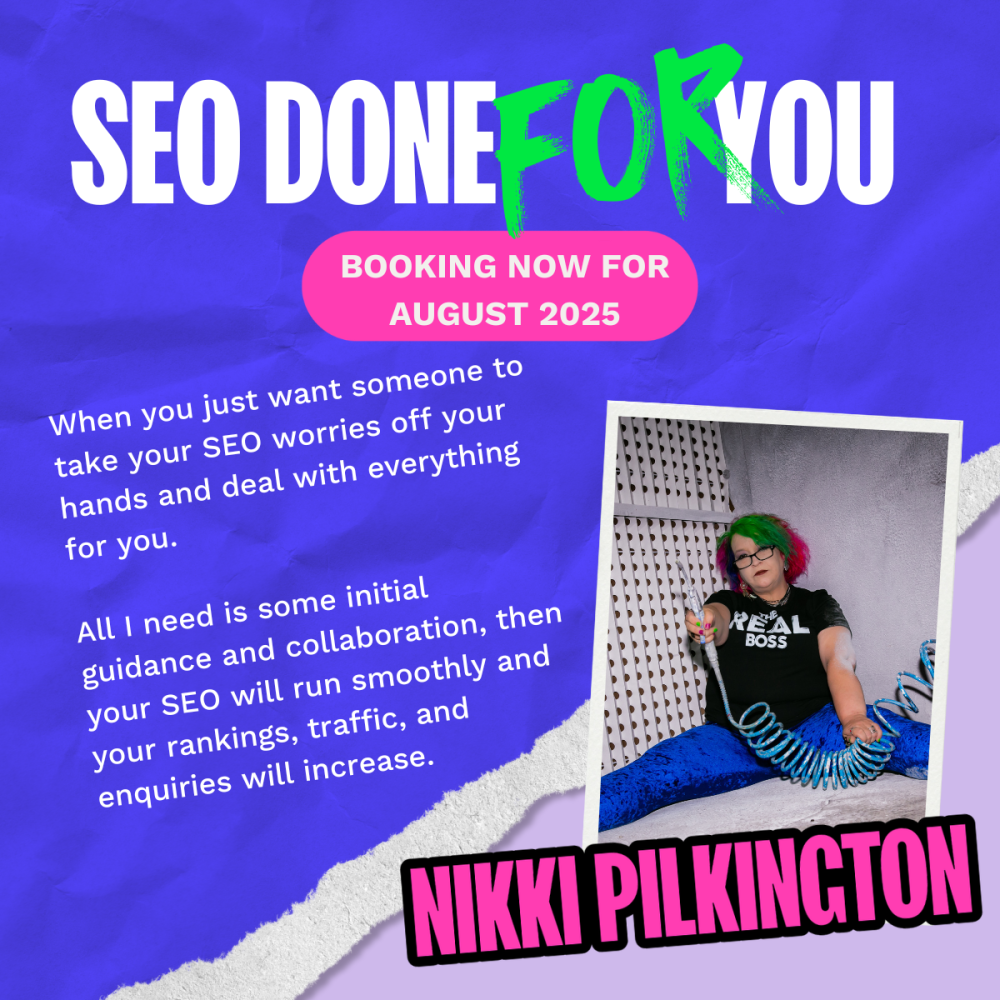
What am I working on this week?
This week I’m knee-deep in keyword research for a cybersecurity company I’m not allowed to name (all very hush-hush and exciting).
I’m also having way too much fun writing web copy for my auction client – this week’s focus is trading cards like Pokemon, which is definitely bringing out my inner geek. I may have squeaked a bit when I realised I had to research the history of Charizard and call it work!
Alongside my usual retainers, I’m thrilled to be starting a new project with website designer extraordinaire Louise ☪ Little Nerd ☪ Foster from Little Nerd Web Design and awesome copywriter Jackie Barrie , working with a security company that protects people, places, and assets. Watch this space!
Need help with any of the above? You know where I am!
That’s it for now,
Always non-wanky
Nikki
P.S. Give that indexing check a try using both the site: search and GSC’s URL inspection tool – you might be surprised to discover which pages you thought were doing their job actually aren’t indexed at all. Understanding the difference between indexing and ranking will save you from wasting time (and money) on the wrong fixes.


